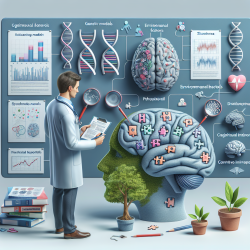Schizophrenia is a complex brain disorder characterized by symptoms such as hallucinations, disordered thinking, and cognitive deficiencies. Despite decades of research, the pathophysiology of schizophrenia remains incompletely understood. However, recent studies have provided valuable insights that can help practitioners improve their skills and treatment approaches.
The Genetic and Environmental Landscape
The initial belief that schizophrenia was purely hereditary has evolved. While certain genes like ZDHHC8 and DTNBP1 suggest susceptibility, no single gene variation has been conclusively linked to the disorder. Instead, recent evidence points to a combination of genetic predispositions and environmental factors as contributors. Practitioners should consider both aspects when assessing patients.
Genetic Insights
- Specific allelic inheritance may contribute to schizophrenia development.
- Genes like DTNBP1 and ZDHHC8 are associated with increased risk.
- Genetic mutations can affect neurotransmitter function and brain connectivity.
Environmental Influences
- Prenatal exposure to viral infections and poor nutrition are significant risk factors.
- Cannabis use during adolescence may increase susceptibility.
- Practitioners should assess environmental histories as part of their diagnostic process.
Cognitive Impairments and Neurodevelopmental Hypotheses
Cognitive dysfunction is a hallmark of schizophrenia. Patients often struggle with memory, critical thinking, and information processing. Functional imaging techniques like fMRI have advanced our understanding of these impairments, revealing disruptions in working memory associated with prefrontal cortex dysfunction.
The neurodevelopmental hypothesis suggests that early brain development defects predispose individuals to schizophrenia. This theory highlights the importance of early intervention strategies in mitigating long-term cognitive impairments.
Implications for Treatment
The integration of genetic and environmental models into treatment plans is crucial. Pharmacological interventions targeting neurotransmitter imbalances are complemented by non-pharmacological approaches such as cognitive rehabilitation and education to improve cognitive reserve.
Pharmacological Treatments
- Atypical antipsychotics like clozapine have shown efficacy in reducing symptoms with fewer side effects compared to older medications.
- Dopamine D2 receptor antagonists like aripiprazole improve cognitive impairments by modulating neurotransmitter systems.
Non-Pharmacological Approaches
- Cognitive training programs can enhance working memory and executive function.
- Environmental modifications and supportive therapies can reduce stressors that exacerbate symptoms.
Encouraging Further Research
The complexity of schizophrenia necessitates ongoing research. Practitioners are encouraged to stay informed about emerging studies that explore novel genetic markers, environmental interactions, and innovative therapeutic interventions. By doing so, they can refine their approaches and offer more personalized care to patients.
To read the original research paper, please follow this link: Schizophrenia pathophysiology: are we any closer to a complete model?










